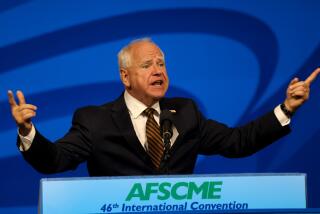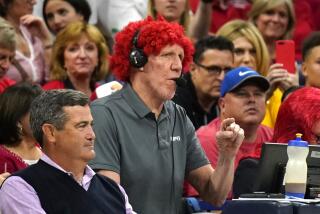There Must Be a Reason Why Quinn Buckner Only Plays for Winners
- Share via
I would like to say Boston is a lucky town because Bill Buckner plays there. I would like to say that, but I cannot.
I cannot because the thought is incomplete. Boston is lucky because more than one Bill Buckner plays there.
The Bill Buckner most people know is the first baseman for the Red Sox.
The Bill Buckner I know is a guard for the Celtics. I have watched Bill play ball for more than half my life. He was the classiest high school athlete I ever saw.
Nobody calls him Bill anymore. He goes by his middle name--Quinn--and has since his sophomore year in high school.
“Bill sounded, I don’t know, too studious,” Quinn Buckner said during a break between games of the NBA championship series. “William Buckner. That sounded like somebody who ought to be a professor. Quinn was better, more original. I never knew any other Quinns.”
His mother did. It was someone’s surname, but that didn’t matter. Her father was a man named Dean Mohr, and he was not just a professor. He was president of Paul Quinn College in Waco, Tex.
Educators run in the Buckner family. Quinn’s mother is principal of an elementary school in Phoenix, Ill., a suburb maybe 20 miles south of Chicago. It is a village so secluded and small that most north side Chicagoans do not even know it exists. Quinn’s father, a William Buckner who stuck to his real first name, is a teacher and athletic director at a grade school a few miles away in East Chicago Heights.
These are poor little towns, where millionaires do not hang out. The men and women work hard, or do not work at all. They work at the odorous Sherwin-Williams paint plant on the expressway, or at the steel foundries across the nearby Indiana state line, or at the Ford stamping plant in the East Heights.
My father worked in such a factory as these. I knew these towns, had friends in these towns, although there were few white families in these communities and few black families in mine.
I went to high school in a fairly large, middle-class industrial city, Chicago Heights. The school also produced a Pulitzer Prize winning political columnist, David Broder; a successful baseball pitcher and author, Jim Bouton; a pro golfer, Carol Mann; an NBA general manager, Jerry Colangelo of the Phoenix Suns, and a bronze medalist in the 1972 Olympic pole vault at Munich, Jan Johnson.
We were good at basketball, too, but our arch-rivals often were better. Those guys were from Thornton, a school that had won a couple of state championships, one in 1966 by a team led by a guy who later played a little NBA ball, Jim Ard. The other had been won in 1933 by a team romantically called the Flying Clouds, led by a guy who later played a little shortstop, Lou Boudreau.
It was just about the time that William Quinn Buckner was entering high school, in 1968, that the school district split. No longer would all the kids in the area go to Thornton High. Some would go to the new school, Thornridge. Among those was the friendly neighborhood junior high school prodigy, Bill Buckner.
This, at first, seemed a bad break to Buckner. He had been looking forward to being at the same school with the Batts brothers, Lloyd and Boyd.
Lloyd Batts was a hang-gliding, super-flying sort of player who was a couple of years older than Buckner, a whole lot flashier, and the legend of local playgrounds. When he moved along to the University of Cincinnati, he outscored everybody who had ever been there, except for one man, Oscar Robertson.
In high school, Bill Quinn Buckner was a younger duplicate of the man he is now. He stood 6 feet, 2 inches but had sort of a squatty body, with a caboose as big as the one on the Illinois Central train to Kankakee.
He was not particularly tall, not particularly fast and did not get off the ground like another David Thompson. Although he was a far better shooter and scorer than he is today, he was not even the kind of kid who could endlessly fill the hoop with baskets.
He was just good.
No, he was better than good. He was grand.
Buckner had maturity beyond his years. He was smart and sensible and played under control. He was a leader when leadership was just another cliche that coaches were trying to ram down teen-agers’ throats. Bob Knight, while recruiting him for Indiana, once called him “a college kid who’s still in high school.”
I watched Quinn Buckner do things I had never seen a person of his age do. He gave tips to teammates during timeouts, when the coach was finished speaking. He threw passes to zones, like a quarterback, where teammates could meet them on a dead run. In the locker room after games, Buckner sometimes gave articulate interviews to local reporters like myself, then returned to his teammates and talked jive. He could make himself comfortable in any company.
Buckner played football, too--for two years at Indiana, as well--and it was funny watching him return kickoffs for touchdowns. He was a powerful runner, and few high school tacklers felt like hurling their bodies in his path. Frequently, he would make the trip untouched.
Saving himself for basketball, though, Buckner usually veered away from contact himself, playing free safety on defense, behind much smaller linemen, and playing flanker or wingback on offense, preferring to catch four or five passes a game to carrying the ball 25 or 30 times.
Even now, looking back on it all, when I asked Buckner if he ever misses football, he said: “Once in a while, but then I remind myself of all those nice bones I might have broken.”
Thornridge’s basketball team won consecutive state championships in a state that takes basketball as seriously as Wisconsin takes cheese. As an upperclassman, Buckner’s teams won 52 games in a row, and 62 of 63. They won their first state title over a team led by C. J. Kupec, who became a star at the University of Michigan and spent some time with the Lakers. They won the second in a championship game that ended with a score of 104-69.
It was some team. Besides Buckner, there were Boyd Batts, a slinky 6-9 center who went to Nevada Las Vegas, and three other players, all small and quick, who were not big stars in college. Greg Rose sings with a band here in California. Ernie Dunn is an engineer in Houston. Mike Bonczyk is a high school coach in Wichita.
Together they were a dream team, like the guys in Jason Miller’s play, “That Championship Season.” They were fast and loose and had a full-court press so tough, even opponents without the ball had trouble crossing midcourt.
When they were juniors, there was a team just across the border, in East Chicago, Ind., that had gone undefeated. Everyone wanted to arrange a challenge match between the two state champs. The Indiana team had Junior Bridgeman, now of the L.A. Clippers; Tim Stoddard, the San Diego baseball pitcher, and Pete Trgovich, the former UCLA basketball player. The challenge never came off, but I never would have bet against Buckner.
He was something. My friend Tom Dreesen, the comedian who made his 47th appearance on the Johnny Carson show the other night and made his 47th reference to having attended Thornton High, used to return home for Thornton-Thornridge games whenever possible and remembers what a leader Buckner was.
“He didn’t holler or lead the men over the hill like John Wayne,” Dreesen said. “He just had a quiet strength that you hardly ever saw in kids that age.
“I remember once when Greg Rose was wide open under the basket, and Boyd Batts took the shot himself instead of passing the ball. You could tell instantly that Rose wasn’t happy about it.
“Well, a few moments later, Buckner led a fast break and had an easy two points himself. Instead, he passed off to Rose, and Rose got the basket. It was a small thing, but I remember noticing the trouble he took to keep everybody happy.”
Possibly that is why Buckner has always been around winners, or vice versa. He won an NCAA title in 1976 with Indiana. He won an NBA title last year with Boston. Even with the Milwaukee Bucks, Buckner’s teams nearly always won their division title.
“He’s always been a smart player, mature, strong on defense, willing to work hard to make up for any natural talents that he lacks,” Celtic coach K. C. Jones said. “I’m sure glad to have him on this team.”
He is very glad, some people suggest, because as a player, Buckner reminds K. C. of K. C.
The years of playing ball are winding down for Buckner. He is no kid anymore. He is married, a father of three, and a man about to end his ninth season in the NBA.
“I don’t know what kind of an individual mark I’ve made, but not playing on too many losers, that’s been satisfying,” he said. “That’s been the most satisfying part of all.”
“Same old Bill,” I said.
“Same old Bill,” Quinn said.
More to Read
Go beyond the scoreboard
Get the latest on L.A.'s teams in the daily Sports Report newsletter.
You may occasionally receive promotional content from the Los Angeles Times.










